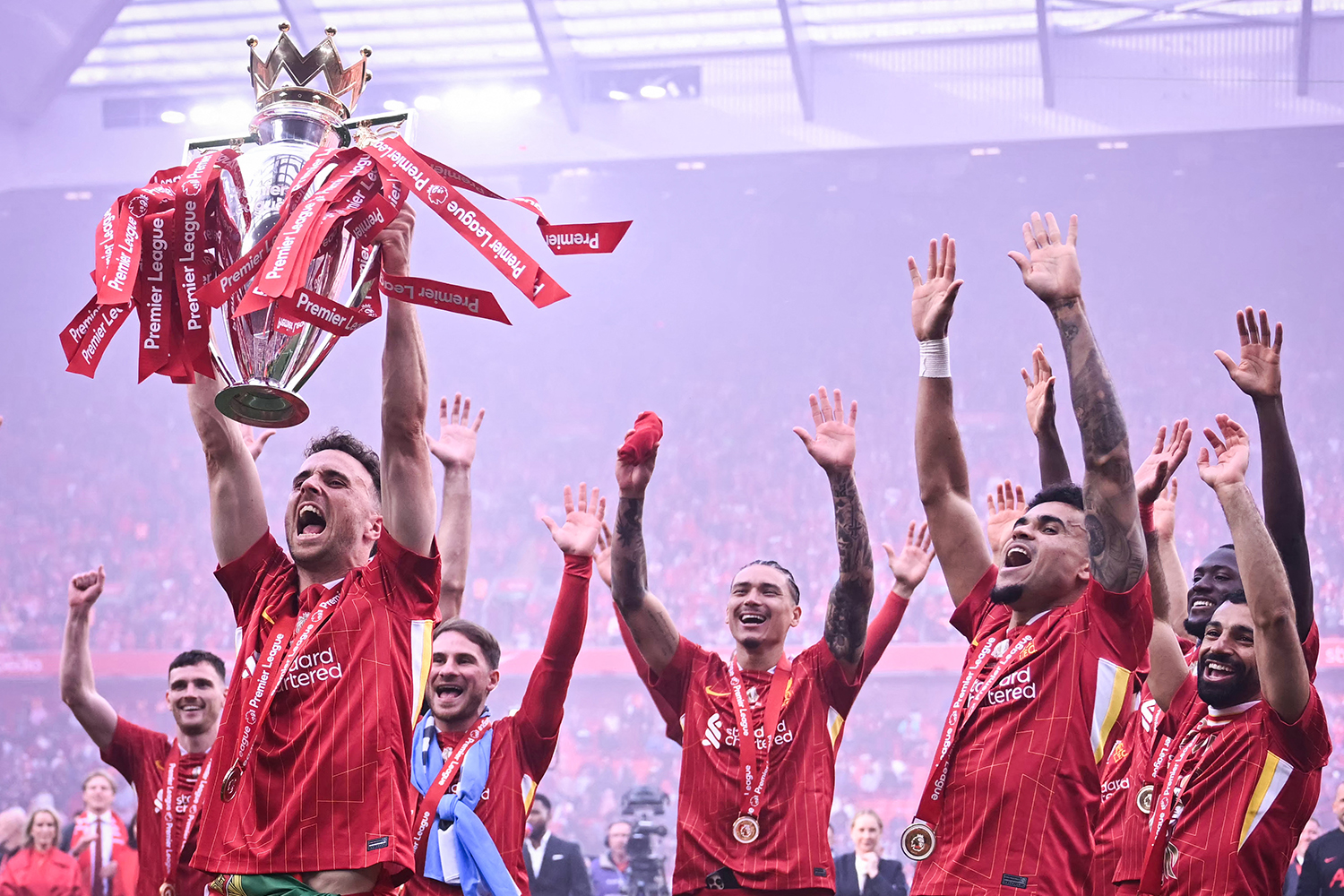Diogo Jota’s last goal for Liverpool encapsulated, perfectly, all that he was. It had been an anxious, fretful evening at Anfield. Arne Slot’s team were clear at the summit of the Premier League, long since anointed champions-elect, but Everton had arrived for the Merseyside derby in an obdurate, spoiling sort of a mood. Liverpool toiled to find a breakthrough, to settle the crowd’s nerves.
Jota had been quiet, too, in truth. As the clock ticked towards the hour, plenty in the crowd might have wondered if perhaps the Portuguese might soon be withdrawn, replaced by Darwin Nuñez. But Jota was always the sort of forward who, as the cliché goes, did not really need to be playing well. He was, in the old-fashioned parlance, a poacher. He had that rare ability to shine brightest in the briefest moments.
His goal, that night, came as a bolt from a clear sky. The ball broke loose on the edge of the Everton box. Luis Díaz backheeled it in the 28-year-old’s general direction. Jota had not scored since January. His confidence, as a whole, seemed to have ebbed. But suddenly he was quicker, sharper than anyone else on the pitch.
He feinted past one tackle, darted past Idrissa Gueye, dropped a shoulder, and found that he had created an ocean of space in a teeming penalty area. He steadied himself. It is not clear, from a distance, quite how he did it, but his shot wrongfooted Jordan Pickford completely. Two seconds, maybe three, and now Anfield was electric.
Jota was by no means the only player in the Premier League capable of scoring a goal like that. But to anyone who had watched him often in his five years at Liverpool, or in his spell at Wolves beforehand, it would have seemed distinctively him. All of it – the instant change of speed, the swiftness of thought, the purposeful invention – was characteristically Diogo Jota.
His death, in a car crash in Spain in the early hours of Thursday morning, is primarily a personal tragedy. He was only 28. He was driving with his younger brother, André Silva, a 26-year-old who played for Penafiel in Portugal, when their car span off the road. Jota had married Rute Cardoso, his long-term partner, less than two weeks ago. They had three young children.
For his family, the loss is a horror, the grief too much to contemplate. That both happened to be footballers is, in that context, irrelevant; that Jota’s career had made him a Premier League champion, a winner of the FA Cup and the Carabao Cup, as well as a winner of the Nations League with Portugal, does not mean his loss is any more significant than that of his brother.
The devastation that the news of his death prompted among his peers and his fans might, in some way, have been accentuated by the fact that Jota was, by all accounts, a particularly grounded, good-natured member of his profession. He wore his fame and his status lightly.
His goal celebrations, often rooted in his love of video games, tended toward the playful, rather than the egotistical, the self-congratulatory. He was never a leading light at Liverpool; he had long had to accustom himself to the idea that he had to fit around others, but he had never complained, never agitated for a move. Footage that emerged, as Liverpool celebrated their title in May, showed that he knew all the words to the song the Kop had adopted in his honour. Perhaps it is imagined, but it feels like he is ever so slightly hesitant to sing the part which declares him to be a better player than Luis Figo. It speaks to a humility that was touching at the time and is all the more poignant now.
But what makes his death so impactful, so difficult to comprehend, is not just the suddenness, a randomness that feels so cruel, but the fact that footballers feel so vivid in our imaginations. Very few of the people who will mourn Diogo Jota had ever had any personal interaction with him. He did not seek the limelight; other than brief vignettes, so it is difficult to say with any certainty what he was like.
Newsletters
Choose the newsletters you want to receive
View more
For information about how The Observer protects your data, read our Privacy Policy
We are reliant on the testimonies and the tributes from those who did know him, who can attest to his “infectious joy,” as the president of the Portuguese Football Federation, Pedro Proenca, put it, or to the humility that his near-neighbour, Jamie Carragher, noted.
And yet, as fans, it is immediately possible to conjure an image of Jota, to sense – if not to describe – what he was as a player. We have that sort of parasocial relationship with all famous people, of course, but to those whose interests sway that way, it is at its most potent with footballers: not just because they seem somehow young and healthy and alive, but because of the emotions they can generate, the moments they can give us.
It is that which makes their loss so hard to understand, but it is also that which ensures their memories always remain. “They say we only lose people when we forget them,” Jota’s Portugal teammate and friend, Ruben Neves, wrote on social media. “I will never forget you.”
It is a sentiment best captured by the author Terry Pratchett. “No-one is actually dead until the ripples they cause in the world die away,” he wrote.
For all footballers, those ripples run further, and deeper, than they do for the vast majority of us; for a player like Jota, the effect is more pronounced still. His last goal encapsulated who he was: electric and instant and in that moment somehow brighter, sharper, more vivid than everyone and everything around him.
Photo by Paul Ellis/AFP via Getty Images



